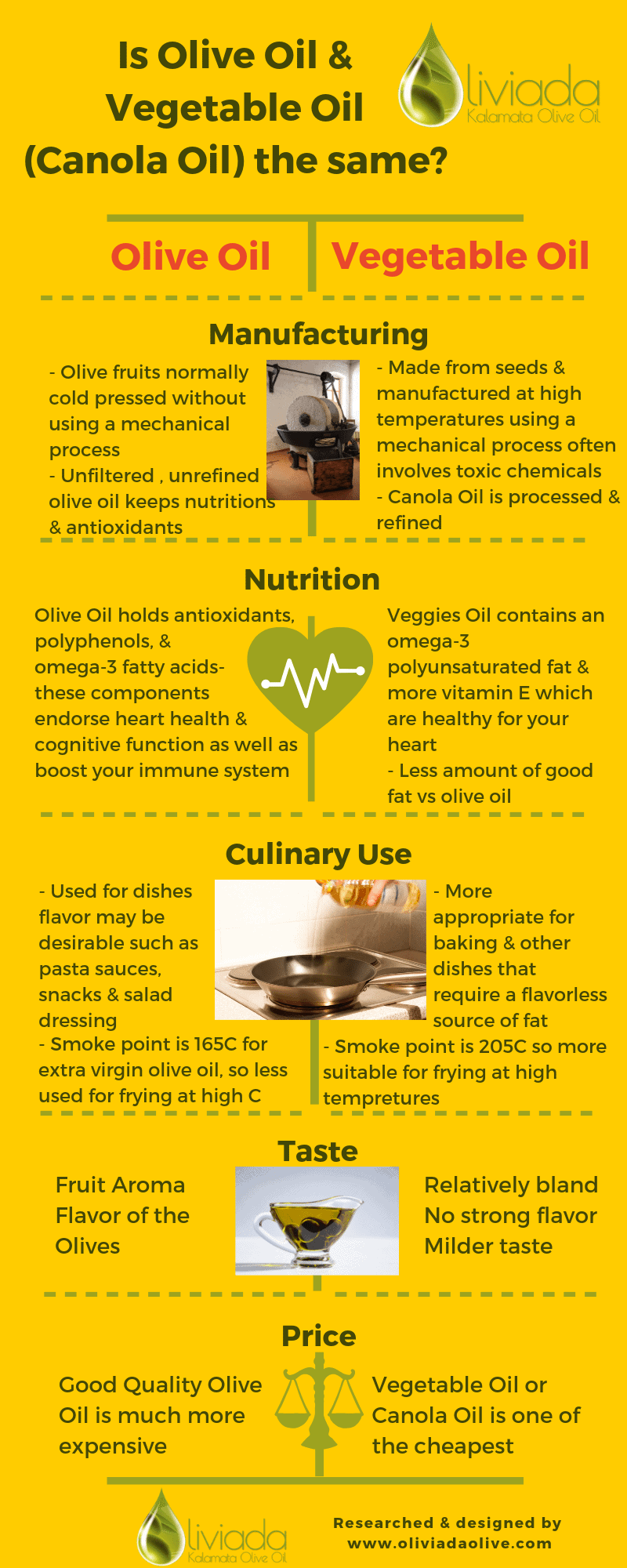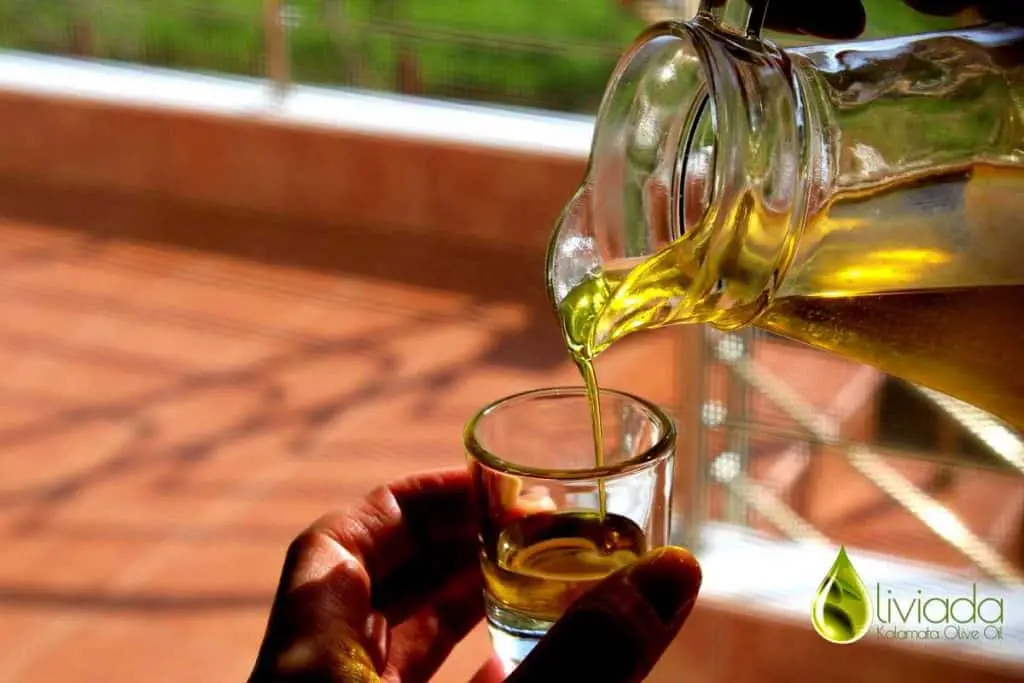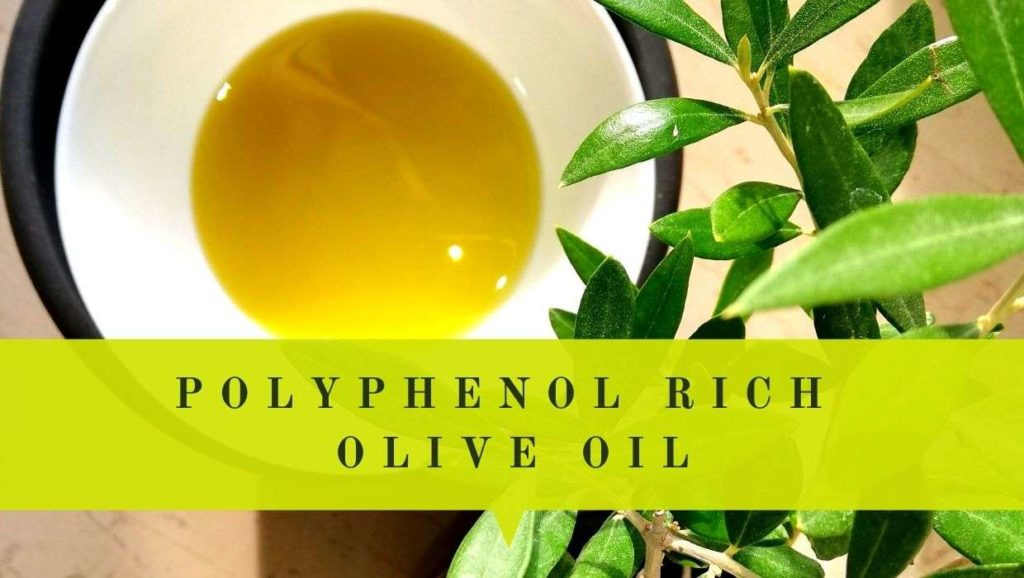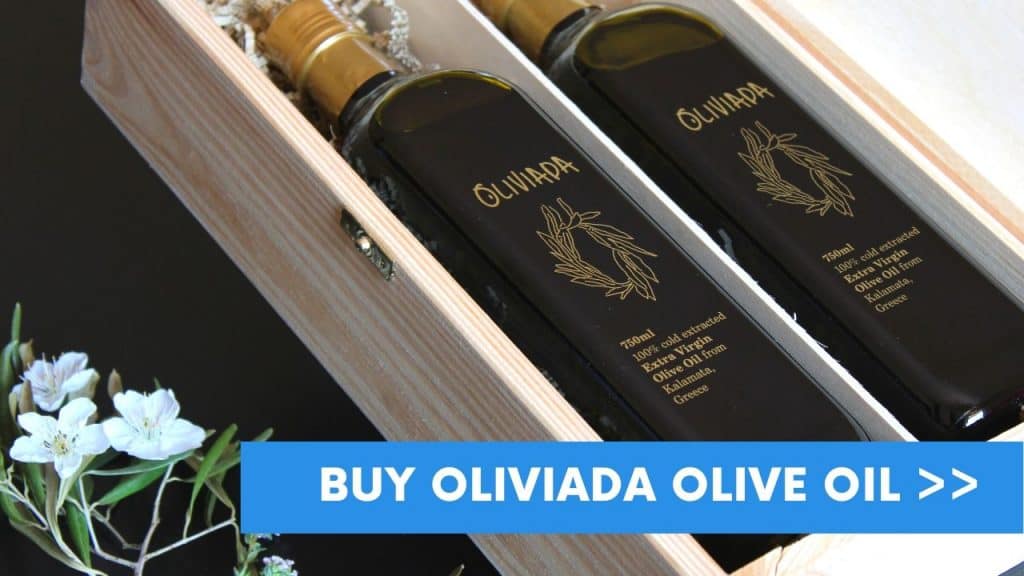This post may contain affiliate links which may generate a small commission from clicks that result in a purchase.
Olive oil and vegetable oil (canola oil in other words) are both heart-healthy oils for cooking, frying, and baking. Nevertheless, while both oils are healthy, the two oils are very diverse.
Olive oil is a fruit oil made by cold pressing ripe olive fruit and collecting their juices. Vegetable oil or canola oil is made from a hybrid of the rapeseed plant and is classified as vegetable oil. Let’s compare olive oil and vegetable oil – let’s find out the key differences in manufacturing, culinary use, and nutrition.
Olive Oil and Vegetable Oil are Manufactured Differently
Olive oil is considered a fruit oil as it is made from squeezing olives, the fruit of the olive tree. Ripe olives are crushed, then normally cold-pressed without using a mechanical process. The collected juices constitute fresh nutritious olive oil. Olive oil is generally pressed at cold temperatures to maintain the nutritional integrity of the oil and labeled as “cold-pressed.”
You may have observed that there are different types of olive oils available for sale: extra virgin, virgin or normal. Extra Virgin Olive Oil is the highest-ranking olive oil collected from the first pressing of the olives and contains the most nutrients. Virgin olive oil is collected from the second pressing and has fewer benefits in terms of nutrition.
Olive juices collected from subsequent pressings are used to make light and pure olive oils; these oils may undergo extra processing and are not so highly ranked compared with Extra Virgin Olive Oil.
Canola oil is made from seeds and belongs to the Brassica family of plants such as cauliflower, cabbage, and broccoli. During harvest, canola seeds are derived from rapeseeds but were especially cross-bred to eliminate many undesirable components of rapeseed, such as glucosinolates, which give rapeseeds a bitter flavor, and erucic acids.
Canola oil production is regulated as well and must meet specific criteria regarding erucic acid a glucosinolate content. In addition, this oil contains omega-3 polyunsaturated fat.
Canola oil opposite to Olive oil is manufactured at high temperatures using a mechanical process that often involves toxic chemicals such as hexane.
Canola oil is processed: degummed, deodorized, bleached, and further refined at high temperatures. These high temperatures can change the omega-3 content of the oil and can significantly raise the oil’s concentrations of trans fatty acids and saturated fats (unhealthy fats).

Olive Oil Contains More Nutrients Than Vegetable Oil
All in all, olive oil is considered the healthier oil because of the amount of “healthy” fats it contains. The Extra Virgin Olive Oil holds antioxidants, polyphenols, and omega-3 fatty acids- these components endorse heart (cardiovascular) health and cognitive (brain-based) function as well as boost your immune system and protect from numerous types of cancer.
Olive oil can even help prevent or reverse type 2 diabetes since it helps your body produce a hormone that supports blood sugar levels. Olive oil even has an anti-inflammatory feature and can be of immense benefit to those with inflammatory diseases like arthritis and osteoporosis.
Canola oil contains more heart-healthy omega-3 fatty acids, which are part of the polyunsaturated fat group.
Structure of Fats
Olive oil contains 76 % monounsaturated fat, 10 % polyunsaturated fat, and 14 % saturated fat.
Canola oil is made up of 63 % monounsaturated fat, 28% percent polyunsaturated fat, and 7 % saturated fat.
More about fats and their benefits read below.
Olive Oil & Canola Oil Culinary Uses
Taste and Aroma
Both vegetable oil and olive oil are known for their use in the kitchen. Vegetable oil has a milder flavor than olive oil and more tasteless. However olive oil tends to retain some of the olive flavors (fruit aroma) after it is pressed.
For this reason, vegetable oil is more appropriate for baking and other dishes that require a flavorless source of fat. In other dishes, such as pasta sauces, snacks, or salad dressings, olive oil’s flavor may be desirable, particularly if the oil is extra virgin and of high quality.
Smoke Point
Vegetable oil has a higher smoke point comparing olive oil and is, therefore, more suitable for frying at high temperatures. If you cook oil at a higher heat than its smoke point, it can cause free radicals to form which may cause cancer or other diseases.
| Type of Oil: | Smoke Point |
|---|---|
| Canola Oil | 457° F (236 °C) |
| Extra Virgin Olive Oil | 375° F (190 °C) |
| Premium Extra Virgin Olive Oil (very low acidity <4) | 405° F (207 °C) |
| Virgin Olive Oil Refined Olive Oil | 391° F (200 °C) |
| Refined Olive Oil | 468° F (242 °C) |
Calories
Olive oil and vegetable oil contain the same amount of calories per serving which is 120 calories per 1 tbsp. Too much consumption of olive oil or vegetable oil may ruin your diet since it has so many calories in such a small serving. However, if you consume oil in moderation and no more than 20 to 35% of your daily calories from fat, it will benefit your health rather than harm.
Are Olive Oil and Vegetable Oil (Canola Oil) the same?
When it comes to comparing the overall benefits of vegetable oil versus olive oil, we should analyze a few aspects. Principally, both these oils are qualitatively healthy to be used on the regular course. Both of them make healthier choices when compared to other oils such as mustard oil or coconut oil. Both vegetable and olive oil is a safe option and contain almost no side effects.
- Numerous research studies have documented that olive oil can beat vegetable oil due to the number of monounsaturated fats which helps to reduce the risk of heart disease. By looking into the analysis further deeper, it is clear that olive oil contains a high amount of good fat than the vegetable oil – it is around twice as high compared with vegetable oil.
- Good quality olive oil contains more beneficial nutrition comparing with vegetable oil. Still, vegetable oil is good for your heart – it is low in saturated fats and high in omega-3 fatty acids and other monounsaturated fats that help to endorse healthy heart (cardiovascular) function.
- Nevertheless, vegetable oil beats olive oil when it comes to saturated fat, which is considered as bad fat. Olive oil contains a slightly higher level of saturated fat than a vegetable.
- When it comes to price, olive oil is much costlier comparing vegetable oil.
- As for the taste, extra virgin and virgin olive oils preserve much more fruit aroma and flavor of the olives from which they’re pressed. Olive oil is widely used for a tasty dip or dressing. There as vegetable oil is relatively bland and suitable more for cooking and baking purpose.
If you are interested to improve your health and increase the quality of life, you can try Oliviada Kalamata Olive Oil produced by a local Greek family. Oliviada Shop ->
Most Popular Editable Oils Benefits & Review
Olive Oil versus Avocado Oil
Both Avocado Oil and Olive Oil have a very similar fatty acid composition with over 70% of monounsaturated (healthy) fat. Both oils have a fairly high smoke point, and you can use them for cooking, baking, and frying. Avocado oil may fare a bit better in the vitamin department, but olive oil shines as a rich source of anti-inflammatory antioxidants.
In terms of taste, olive oil has a fruity aroma, tastes pungent, and a little bitter. Avocado oil is more insipid and has a milder taste.
Olive Oil versus Coconut Oil
Olive Oil is one of the healthiest and nutritious oils for cooking, frying, and eating. According to the American Heart Association, Olive Oil produced on the Mediterranean coast and globally is high in fat, but most of them are heart-healthy monounsaturated fat. Choosing Kalamata Olive Oil containing more healthy fat can be beneficial to your health and can reduce bad cholesterol levels. Also, Olive Oil can also contribute to healthy digestion and prevent heart disease or cancer incidents.
Coconut oil is high in saturated fats that have different effects than most other fats in your diet. These fats can increase fat burning and provide your body and brain with swift energy.
Coconut Oil and Olive Oil has different effects and can be used in your diet together on a regular course.
Olive Oil versus Corn Oil
Corn oil contains more phytosterols than olive oil. It is a component found in plant cell membranes that help block cholesterol absorption in the digestive system. There is 132 mg in one serving of corn oil, compared to 30 mg in a serving of olive oil.
But don’t give up your olive oil just yet—researchers witnessed a lower heart rate and diastolic blood pressure when people were eating foods with olive oil.

Olive Oil versus Palm Oil
Palm Oil is a palm fruit oil derived from the fleshy part of the palm fruit. It is a combination of roughly 50% saturated fat and 40% monounsaturated fat (oleic acid – the same type of fat in olive oil). The remaining 9-10% is polyunsaturated fat – it is a very low amount of these inflammatory type of fat, which is brilliant. Neither saturated nor monounsaturated fats are easily damaged by processing palm oil so you can include this fat into your diet with confidence.
Olive Oil versus Peanut Oil
Olive Oil and Peanut Oil both are high in monounsaturated fats and in diet studies are equal with regard to lowering cholesterol and triglycerides when compared to a “standard American diet”. The health effects of all the other thousands of components in these oils are not well understood.
Olive oil is natural and pure in the sense that it is one of the few plant oils which is edible as cold-pressed from the plant without chemical processing. On the opposite, the peanut oil must be chemically processed. This may remove natural ingredients and healthful anti-oxidants.
Taste-wise, extra virgin olive oil has a delicious fruity flavor; most peanut oil has had all flavors removed and feels tasteless.
Olive Oil versus Rapeseed Oil
Rapeseed Oil is lower in saturated fat, higher in vitamin E, and has a higher smoke point, making it the better choice for cooking. However, it doesn’t have the polyphenols or as many healthy fats that extra virgin olive oil holds.
Olive Oil versus Sesame Oil
Olive Oil and Sesame Oil each have about the same number of calories – 120 per tablespoon – and they are both loaded with healthy fats. Nevertheless, both oils have different flavor profiles, which can change the outcome of your meal. Sesame oil has an earthy, nutty flavor, while olive oil has a fruity aroma, rich taste.
Overall, if you prefer your dish to be more nutritious full of vitamins and minerals, olive oil is a better choice because it has higher levels of these nutrients.
Olive Oil versus Soybean Oil
All plant oils have different nutrient profiles and types of fats they contain comparing olive oil. You should choose the plant oil that best fits into your diet depending on the type of fat missing in your current diet as a whole and that’s best matched to your cooking needs.
Soy Oil would be especially helpful for a diet that was missing the important omega-6 fatty acid called linoleic acid. (Soy oil is about 50% linoleic acid). It would also be helpful for a diet that needed more monounsaturated fat (soy oil is approx 25% monounsaturated).
Let’s compare soybean oil with the profiles of two other commonly chosen oils. Almost 75% of the total fat of olive oil is monounsaturated fat. As well there are about 10% linoleic acid and a very small amount of linolenic acid, an omega-3 fatty acid in olive oil. As for the further comparison with canola oil, it contains approximately 60% monounsaturated fats, 20% linoleic acid, and about 10% linolenic acid.
Olive Oil versus Sunflower Oil
Both the oils are plant-based and contain roughly 120 calories per tablespoon. Both are rich in polyunsaturated and monounsaturated fats. These kinds of fatty acids are known to bring down the bad cholesterol in your blood while promoting good cholesterol.
However, Olive Oil is healthier than Sunflower Oil in terms of Vitamin K content, fatty acids, and minerals. Olive oil does not interfere with the omega 6 fatty acid and omega 3 fatty acid balance, whereas sunflower oil may increase the ratio of these fatty acids. The polyunsaturated fats in sunflower oil can make it go rancid more easily than olive oil. Olive oil also has a fruity taste unlike sunflower oil, which is bland.
Source: BBC News; Health Harvard
Read Next
Learn More
- Olive Oil Extraction Process
- Best Olive Oil Worldwide
- Kalamata Olives are New Superfood
- Healthy Mediterranean Side Dishes
Hi, I’m Vangelis Kleftogiannis, the founder of Oliviada and an established olive oil expert from Kalamata, Greece. My expertise isn’t just in producing quality Extra Virgin Olive Oil, but also in the cultivation and care of olive trees themselves. I am deeply committed to sharing my knowledge and know-how, helping others understand the intricacies of olive tree growing and the creation of quality olive oil.



